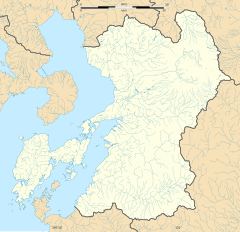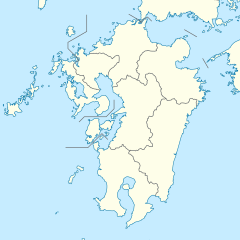Shin-Minamata Station
Shin-Minamata Station 新水俣駅 | |||||||||||
|---|---|---|---|---|---|---|---|---|---|---|---|
 Shin-Minamata Station | |||||||||||
| General information | |||||||||||
| Location | 305 Hatsuno, Minamata-shi, Kumamoto-ken 867-0002 Japan | ||||||||||
| Coordinates | 32°12′40″N 130°25′45″E / 32.210993°N 130.42925°E | ||||||||||
| Operated by | |||||||||||
| Line(s) | |||||||||||
| Platforms | 1 side + 2 island platforms | ||||||||||
| Other information | |||||||||||
| Station code | OR12 | ||||||||||
| History | |||||||||||
| Opened | 13 March 2004 | ||||||||||
| Services | |||||||||||
| |||||||||||
| |||||||||||
Shin-Minamata Station (新水俣駅, Shin-Minamata-eki) is a junction passenger railway station located in the city of Minamata, Kumamoto, Japan. It is operated by Kyushu Railway Company (JR Kyushu) and by the third-sector railway company Hisatsu Orange Railway.[1]
Lines
[edit]The station is served by the Kyushu Shinkansen and is 194.1 kilometers from the starting point of the line at Hakata and 816.4 kilometers from Shin-Osaka. It is also served by the Hisatsu Orange Railway Line that follows the former coastal route of the JR Kyushu Kagoshima Main Line connecting Yatsushiro and Sendai. It is located 45.8 km from the starting point of the line at Yatsushiro.[2]
Station layout
[edit]The JR portion of the station consists of one elevated side platform and one elevated island platform.There are no passing tracks and platform safety barriers have been installed for safety. The station has a Midori no Madoguchi staffed ticket office.The station building was designed by Makoto Sei Watanabe[3] and opened on 13 March 2004.[2] The Hisatsu Orange Railway portion of the station has one island platform and two tracks. The platform is accessed via a level crossing. There is no station building and the station is unattended.[1]
Platforms
[edit]| 11/12 | ■ Kyushu Shinkansen | for Kumamoto, Hakata, and Shin-Ōsaka (island platform) |
| 13 | ■ Kyushu Shinkansen | for Izumi, Sendai, and Kagoshima-Chūō (side platform) |
| 1 | ■ ■ Hisatsu Orange Railway | for Minamata and Izumi |
| 2 | ■ ■ Hisatsu Orange Railway | for Yatsushiro and Shin-Yatsushiro |
Gallery
[edit]-
Station sign
-
Shinkansen platforms
-
Hisatsu Orange Railway
Adjacent stations
[edit]| ← | Service | → | ||
|---|---|---|---|---|
| Hisatsu Orange Railway Line | ||||
| Tsunagi | - | Minamata | ||
History
[edit]On19 September 1968, Japan National Railway (JNR) established Hatsuno Signal Stop. It was elevated to a full station and named "Shin-Minamata" on 13 March 2004 with the opening of the Kyushu Shinkansen. The JR Kyushu portion of the statin was transferred to the control of the Hisatsu Orange Railway.
Passenger statistics
[edit]In fiscal 2020, the JR portion of the station was used by an average of 344 passengers daily (boarding passengers only), and it ranked 257th among the busiest stations of JR Kyushu.[4] The average daily passenger traffic for the Hisatsu Orange Railway Line in fiscal 2019 was 91 passengers.[5]
Surrounding area
[edit]- Minamata Castle Ruins
- Minamata Municipal Hatsuno Housing Complex
- Japan National Route 3
- Japan National Route 268
See also
[edit]References
[edit]- ^ a b "新水俣駅" [Shin-Minamata Station]. hacchi-no-he.net. Retrieved 16 March 2018.
- ^ a b Kawashima, Ryōzō (2013). 図説: 日本の鉄道 四国・九州ライン 全線・全駅・全配線・第5巻 長崎 佐賀 エリア [Japan Railways Illustrated. Shikoku and Kyushu. All lines, all stations, all track layouts. Volume 5 Nagasaki Saga area] (in Japanese). Kodansha. pp. 22, 67. ISBN 9784062951647.
- ^ "Shin-Minamata Station - Makoto Sei Watanabe". Archello. Retrieved 9 May 2023.
- ^ "駅別乗車人員上位300駅(2020年度)" (PDF). Retrieved 8 September 2023.
- ^ National Land Numerical Information (passenger traffic by station data) - Ministry of Land, Infrastructure, Transport and Tourism, accessed September 6, 2021.
External links
[edit] Media related to Shin-Minamata Station at Wikimedia Commons
Media related to Shin-Minamata Station at Wikimedia Commons- JR Kyushu station information
- Kumamoto pref. Station information - 2008 Archive
- Design concept description - Makoto Sei Watanabe






